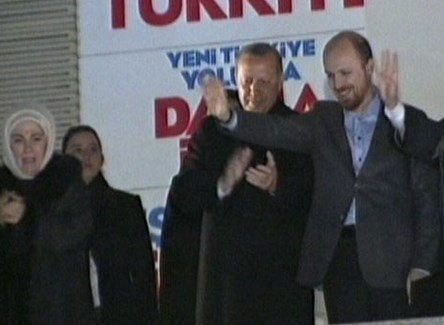G-20 Summit: Papandreu withdraws plan for referendum
Greek PM Papandreou withdraws from his plans to hold a referendum about a bailout plan one day after harsh warning by Germany and France. The plan is crucial for future generations, he tells leaders at the G-20 summit in Cannes. Prior to a critical parliament meeting today, he also says he won’t resign
A man sits at the stairs of Zappeion hall in Athens yesterday. Demands mounted yesterday for Greek Prime Minister George Papandreou to resign and withdraw from holding a referendum for European bailout plan. AP photoGreece failed to signal any sign of determination to European lenders as Prime Minister George Papandreou, who rejected rumors about his possible resignation, has stepped from a much-debated referendum decision that was harshly criticized by European powerhouses.
Papandreou said yesterday that he was prepared to drop plans for taking the International Monetary Fund- (IMF) and European Union-backed austerity measures to a public vote.
“The referendum was never an end in itself,” Papandreou told the Cabinet, according to statements released by his office.
“We had a dilemma, either true assent or a referendum. I said yesterday [Nov. 2], if the assent were there, we would not need a referendum,” Papandreou said.
“The [IMF and EU] plan is crucial for the future generations of our country,” he said later in Cannes during a G-20 leaders’ summit opening ceremony in the rain-swept French resort, where leaders implored the eurozone to put its house in order.
Crisis spreading
Leaders of the world’s most powerful economies have faced fresh turmoil from a titanic debt crisis which could force Greece from the eurozone and drag down Italy.
Italy saw its borrowing costs hit record highs amid fears over Europe’s bail-out mechanism.
French and Spanish bond sales also saw wider spreads, as markets lost confidence in last week’s rushed plan to end the debt crisis.
Italy’s long-term borrowing costs hit 6.4 percent, which observers warned was unsustainable. Italian Prime Minister Silvio Berlusconi will present an urgently drafted reform package aimed at reining in the country’s runaway debt to parliament next week, a government source said yesterday.
French President Nicolas Sarkozy and his German counterpart, Chancellor Angela Merkel, had hoped to reassure their partners by forcing Papandreou to quickly implement an EU bailout deal.
Papandreou was summoned to pre-summit talks on Nov. 2 and agreed to hasten his planned referendum on the plan, insisting Greece wanted to stay in the euro, but he flew home to find his parliamentary majority evaporating.
Merkel and Sarkozy had warned Greece would not receive “one more cent” of the IMF and EU’s next planned eight-billion euro ($11 billion) aid installment until he wins the referendum, which he wants to hold on Dec. 4.
Without these funds, Greece could face a default which would force it to leave the euro, senior officials in Cannes said.
“We do not want to let the euro be destroyed, we do not want to let Europe be destroyed,” Sarkozy said, standing with Merkel. “The Greek people are free to choose, but we are accountable for the stability of the eurozone.”
Papandreou insisted yesterday that he would not resign in the face of a growing party revolt over shock plans to hold a referendum on a bailout plan, state television channel NET reported.
Papandreou earlier said it was the “democratic right” of the Greeks to vote on the bailout plan
Emerging giants pressured EU countries at the G-20 to solve their debt crisis, with Beijing dangling $100 billion in rescue funds if the eurozone guarantees its bailout will work.
Medvedev does not want to hurt feelings
Along with China, Russia cautiously offered Europe financial aid, but President Dmitry Medvedev also scolded European governments, saying they must act more decisively to clear up their mess.
“I don’t want to hurt anybody’s feelings, but in my opinion our partners’ actions need to be much more dynamic and decisive in bringing about order,” Medvedev said.
Medvedev met his Brazilian, Indian, Chinese and South African counterparts ahead of the official opening of the G20 summit where they “discussed the European debt crisis.”
Kremlin economic advisor Arkady Dvorkovich said the leaders agreed they would “work out a common position of BRICS member states on the eurozone.”
Bookmaker bets Greece will exit euro
British bookmaker William Hill offered odds of 4/6 yesterday that Greece will cease to use the euro by the end of 2012, the first time it has bet odds-on that Athens will exit the currency.
It came after Greek Prime Minister George Papandreou’s shock decision earlier this week to offer a referendum on the euro, which has stunned fellow eurozone nations and sparked a revolt among his allies in Athens.
“For the first time we are betting odds-on that the Greeks will quit the euro,” said William Hill spokesman Graham Sharpe in a statement. They offered odds of 11/10 that the Greeks will still be using the euro on December 31, 2012.
03.11.2011
SOURCE: HURRIYET DAILY NEWS



